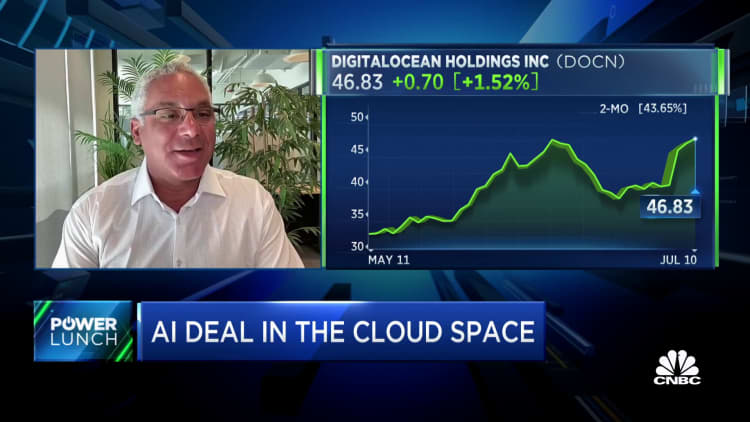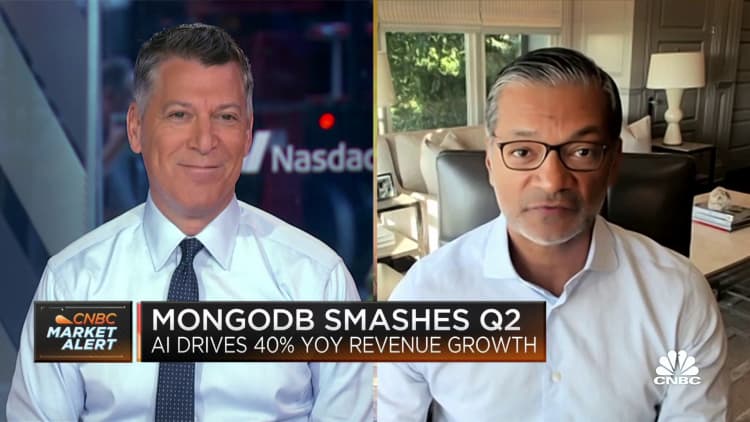

Olivier Pomel, co-founder and CEO of Datadog, speaks at the company’s Dash conference in San Francisco on Aug. 3, 2023.
Datadog
Albert Wang, a native Californian, moved to New York from Boston with his wife a decade ago and got a job as a product manager at Datadog, which at the time was a fledgling startup helping companies monitor their cloud servers and databases.
New York had its share of startup investors and venture-backed companies, but it wasn’t a hotbed of tech activity. The San Francisco Bay Area was the dominant tech scene. On the East Coast, Boston was better known as the hub of enterprise technology.
But Datadog grew up — fast — going public in 2019, and today it sports a market cap of over $28 billion. After four years at the company, Wang left but chose to stay in New York to launch Bearworks, providing software to sales reps. The city is totally different from the place he encountered when he arrived, and you can feel it when you’re out at a bar or restaurant, Wang said.
“Now it’s extremely diversified — there are more people doing startups,” he said. Before, “you tended to be surrounded by consultants and bankers, but more and more now, there’s tech.”
Datadog’s initial public offering was followed less than two years later by UiPath, which develops software for automating office tasks. They were both preceded by cloud database developer MongoDB in 2017 and e-commerce platform Etsy in 2015.
None of those Big Apple companies are huge by the tech industry’s standards — market caps range from $9 billion to just under $30 billion — but they’ve created an ecosystem that’s spawned many new startups and created enough wealth to turn some early employees into angel investors for the next generation of entrepreneurs.
While the tech industry is still trying to bounce back from a brutal 2022, which was the worst year for the Nasdaq since the 2008 financial crisis, New Yorkers are bullish on the city that never sleeps.
Among the 50 states, New York was second to California last year, with $29.2 billion invested in 2,048 startups, according to the National Venture Capital Association. Massachusetts was third. In 2014, prior to the run of New York City IPOs, California was the leader, followed by Massachusetts and then New York.
Annual capital deployed in New York over the past nine years has increased sevenfold, NVCA data shows. And that’s after last year’s steep industrywide slump. During the record fundraising year of 2021, New York startups received almost $50 billion across 1,935 companies.
California companies raised three times that amount, and the Bay Area has its own share of startup market momentum. Following the launch of ChatGPT in November from San Francisco’s OpenAI, the city has become a mecca for artificial intelligence development.
Investors have pumped over $60 billion into Bay Area startups so far this year, with half of the money flowing to AI companies, according to data from PitchBook.
Northern California has long been the heartbeat of the tech industry, but Murat Bicer remembers what it was like for New York startups before the rush. In 2012, his Boston-based firm, RTP Ventures, presented a term sheet for a funding round to Datadog but wanted one more investor to participate.
“We talked to so many firms,” said Bicer, who left RTP for venture firm CRV in 2015. “So many at the time passed because they didn’t think you could build an enterprise software company in New York. They said it had to be in Boston.”
That dynamic challenged Olivier Pomel, Datadog’s French co-founder and CEO, who had built up a local network after working in New York for a decade. Boston had the enterprise scene. The rest of tech was in Silicon Valley.
“VCs from the West Coast were not really investing outside the West Coast at the time,” Pomel said.
But Pomel was determined to build Datadog in New York. Eventually, Index Ventures, a firm that was founded in Europe, joined in the funding round for Datadog, giving the company the fuel to grow up in the city. Pomel relocated the company to The New York Times building off Manhattan’s Times Square.
For New York to keep the momentum, it will need to churn out a continuing string of successes. That won’t be easy. The IPO market has finally shown some signs of life over the past week after being shuttered for almost two years, but investor enthusiasm has been muted and there aren’t many obvious New York-based tech IPO candidates.
Startups proliferated in New York during the dot-com boom, but many disappeared in the 2000s. Datadog, MongoDB and cloud infrastructure provider DigitalOcean all popped up after the Great Recession. DigitalOcean went public in 2021 and now has a market cap of just over $2 billion.
Employees from those companies and even a few of their founders have formed new startups in New York. Google and Salesforce are among Big Tech employers that bolstered their presence in the city, making it easier for tech startups to find people with the right skills. And investors who for decades had prioritized the Bay Area have recently set up shop in New York.
‘No question’ you can go big in New York
Andreessen Horowitz, GGV Capital, Index and Lightspeed Venture Partners expanded their presence in the city in 2022. In July of this year, Silicon Valley’s most prized firm, Sequoia Capital, which was MongoDB’s largest venture investor, opened a New York office.
“Today, there’s absolutely no question in my mind that you can build fantastic businesses in New York,” said Bicer.
Eliot Horowitz, who co-founded MongoDB in 2007 and is now building a New York-based robotics software startup called Viam, shared that sentiment.
“The biggest difference between now and then is no one questions New York,” Horowitz said.
Horowitz is among a growing group of successful founders pumping some of their riches back into New York. He backed DeliverZero, a startup that allows people to order food in reusable containers that can be returned. The company is working with around 200 restaurants and some Whole Foods stores in New York, Colorado and California.
Eliot Horowitz, co-founder of Viam and formerly co-founder and chief technology officer of MongoDB, speaks at the Collision conference in Toronto on May 23, 2019.
Vaughn Ridley | Sportsfile | Getty Images
Wainer, a co-founder of DigitalOcean, invested in collaboration software startup Multiplayer alongside Bowery Capital. He’s also backed Vantage, a cloud cost-monitoring startup founded by ex-DigitalOcean employees Brooke McKim and Ben Schaechter. Vantage, with 30 employees, has hundreds of customers, including Block, Compass and PBS, Schaechter said.
Meanwhile, Wainer has moved to Florida, but he’s building his new company in New York. Along with fellow DigitalOcean co-founder Ben Uretsky, he started Welcome Homes, whose technology lets people design and order new homes online. The company has over $47 million worth of homes under construction, said Wainer, who visits Welcome’s headquarters every month or two.
Wainer said that companies like DigitalOcean, which had over 1,200 employees at the end of last year, have helped people gain skills in cloud software marketing, product management and other key areas in technology.
“The pool of talent has expanded,” he said.
That has simplified startup life for Edward Chiu, co-founder and CEO of Catalyst, whose software is designed to give companies a better read on their customers. When he ran customer success at DigitalOcean, Chiu said finding people with applicable experience wasn’t easy.
“That function, even just a decade ago, just wasn’t relevant in New York City,” Chiu said. “Nowadays, it is very easy to hire in New York City for any role, really.”
The ecosystem is rapidly maturing. When Steph Johnson, a former communications executive at DigitalOcean and MongoDB, got serious about raising money for Multiplayer, which she started with her husband, the couple called Graham Neray.
Investing in the next generation
Neray had been chief of staff to MongoDB CEO Dev Ittycheria and had left the company to start data-security startup Oso in New York. Neray told the Multiplayer founders that he would connect them with 20 investors.
“He did what he said he would do,” Johnson said, referring to Neray. “He helped us so much.” Johnson said she and her husband joked about naming their startup Graham because of how helpful he’d been.
To some degree, Neray was just paying his dues. To help establish Oso, Neray had looked for help from Datadog’s Pomel. He also asked Ittycheria for a connection.
Dev Ittycheria, CEO of MongoDB
Adam Jeffery | CNBC
“I have an incredible amount of respect for Oli and what he achieved,” Neray said, referring to Pomel. “He’s incredibly strong on both the product side and the go-to-market side, which is rare. He’s in New York, and he’s in infrastructure, and I thought that’s a person I want to learn from.”
Pomel ended up investing. So did Sequoia. Now the startup has over 50 clients, including Verizon and Wayfair.
Last year, MongoDB announced a venture fund. Pomel said he and other executives at Datadog have discussed following suit and establishing an investing arm.
“We want the ecosystem in which we hire to flourish, so we invest more around New York and France,” Pomel said.
Ittycheria has had a front-row seat to New York’s startup renaissance. He told CNBC in an email that when he founded server-automation company BladeLogic in 2001, he wanted to start it in New York but had to move it to the Boston area, “because New York lacked access to deep entrepreneurial talent.”
Then came MongoDB. By the time Ittycheria was named CEO of the database company in 2014, New York “was starting to see increasing venture activity, given the access to customers, talent and capital,” Ittycheria said. The company’s IPO three years later was a milestone, he added, because it was the city’s first infrastructure software company to go public.
The IPO, he said, showed the market that people can “build and scale deep tech companies in New York — not just in Silicon Valley.”
WATCH: MongoDB CEO Dev Ittycheria on Q2 results: Very pleased with how company is positioned for the future







